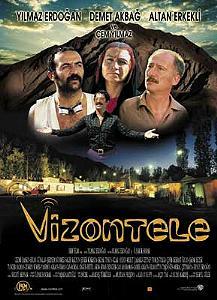Kardeş Türküler is a contemporary Turkish ethnic/folkloric band. It was formed in 1993 with a series of stage performances given by the music branch of the Folklore Club at Boğaziçi University in Istanbul, Turkey.

Cinema of Turkey or Turkish cinema, or Türksineması refers to the Turkish film art and industry. It is an important part of Turkish culture, and has flourished over the years, delivering entertainment to audiences in Turkey, Turkish expatriates across Europe, Balkans & Eastern Europe, also more recently prospering in the Arab world besides the Egyptian cinema and to a lesser extent, the rest of the world.

Ali Ata Demirer is a Turkish filmmaker, stand-up comedian, actor, and musician.
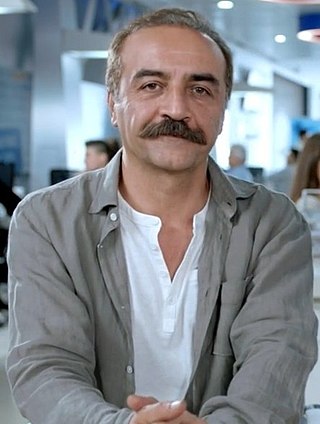
Yılmaz Erdoğan is a Turkish filmmaker, actor and poet who is most famous for his box-office record-breaking debut comedy film Vizontele (2001) and the television series Bir Demet Tiyatro (1995–2002/2006–2007). He founded BKM Theatre and Film Production. He was awarded the Best Supporting Actor at 4th Australian Academy of Cinema and Television Arts Awards for his performance in The Water Diviner (2014).

Vizontele Tuuba is a 2004 Turkish comedy-drama film, written and directed by Yılmaz Erdoğan, based on the writer-director's childhood memories of the last summer of his childhood in village in 1980. The film, which went on nationwide release on January 23, 2004, was a sequel to the highly successful Vizontele (2001).
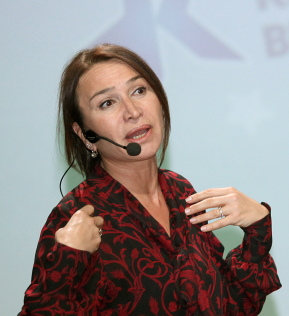
Demet Akbağ is a Turkish theatre, film actress and acting trainer.
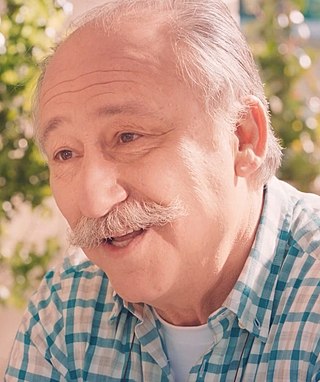
Reşit Altan Erkekli is a Turkish theatre, film and television actor.

Erkan Can is a Turkish film and theatre actor, who has won the Golden Orange for Best Actor twice for his roles in On Board and Takva: A Man's Fear of God, and the Asia Pacific Screen Award for Best Performance by an Actor for Takva: A Man's Fear of God.

Tolga Çevik is a Turkish actor, most known from the hit films "Organize İşler", Vizontele and the hit series Avrupa Yakası, improvisation theatre "Tolgshow".
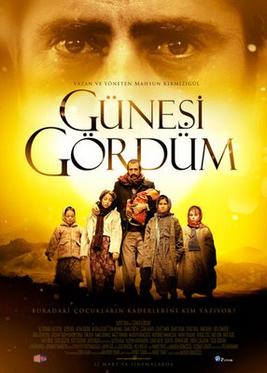
I Saw the Sun is a 2009 Turkish drama film, written and directed by Mahsun Kırmızıgül, which tells of a Kurdish family who are forced from their village in southeastern Turkey by the conflict there. The film, which was released on 13 March 2009, was one of the highest grossing Turkish films of 2009, prompting its re-release on 18 September 2009. The film was Turkey's official submission for the Academy Award for Best Foreign Language Film at the 82nd Academy Awards, but it was not nominated.
Zeki Ökten was a Turkish film director.
Çok Güzel Hareketler Bunlar

The 3rd Yeşilçam Awards, presented by the Turkish Foundation of Cinema and Audiovisual Culture (TÜRSAK) and Beyoğlu Municipality, honored the best Turkish films of 2009 and took place on March 23, 2010, at the Lütfi Kırdar Congress and Exhibition Hall in Istanbul, Turkey. Veteran Turkish actress Filiz Akın received the Special Achievement Award.
The Yeşilçam Award was the national film award of Turkey, which was presented annually by the Turkish Foundation of Cinema and Audiovisual Culture (TÜRSAK) and Beyoğlu Municipality from 2008 to 2011. The award, which had been named after Yeşilçam Street in the Beyoğlu district of Istanbul where many film studios were based during the 1950s-1970s, was discontinued following the announcement by the Alliance of Cinema Labor Unions' Yeşilçam Film Academy (YEFA) intention to start issuing their own Yeşilçam Academy Award in protest against TÜRSAK's disregard of their suggestions to give the awards a more professional structure.
Olgun Şimşek is a Turkish actor.

Hükümet Kadın is a 2013 Turkish comedy film directed by Sermiyan Midyat.

Erdal Tosun was a Turkish actor.
Have You Ever Seen Fireflies? is a play written by Yılmaz Erdoğan. A feature film based on the play was released in 2021 via Netflix, directed by Andaç Haznedaroglu and starring Yılmaz Erdoğan, Ecem Erkek and Engin Alkan.
